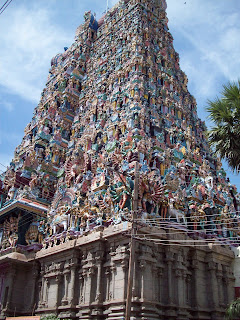
On Wednesday our entire group and one of the FIMRC staff
rented a car and driver for the day to make a trip to the city of Madurai. Madurai is the closest large city (pop. 1.2
million) and is a couple of hours drive.
It is famous for its temples, which were built in the 17th
century.
Our first stop was the Meenakshi
Sundareswarar temple. The temple is
enormous (the size of a city block). It
has four gates, one on each side and named for the cardinal directions. At each gate is an enormous tower, soaring
into the air, and brightly painted and decorated with figures of Hindu gods and
other important figures. In order to
enter the temple we had to take off our shoes and go in our socks.
Before going into the temple the girls all got a bindi (mark on the forehead) and flowers in their hair.
The inside of the temple was filled with stone pillars, intricately carved with the figures of Hindu gods. The first section that we came to was full of vendors. Many selling souvenirs from stalls they had erected around the stone pillars. You could buy carpets, pictures, jewelry, and also plastic toys, bangles, jewelry and food to use to make offerings to the gods (coconuts and bananas were a common combination).
The rest of the temple was
less commercial. Many large sections
were actually off limits to foreigners, and these were the most sacred
areas. However, in the parts that we
could go, there were many statues and shrines to various Hindu gods which were
actively being worshiped. Many had food,
lit candles, or daubs of paint to show that people had recently been
worshiping.
At one point we encountered
an elephant, which after taking a rupee from your hand, would bless you by
patting you on the head with its trunk.
This temple as different
from American churches in many ways- sheer size, the nature of the stone
figures, the brightly painted roof and towers, the sheer interactivity
(touching everything, having vendors inside the temple), etc.
After lunch, our driver took
us to the Gandhi Museum, where we learned about British colonialism and the
road to independence with the Mahatma (meaning “great soul”). Besides opposing colonial rule, Gandhi also
worked to end the caste system with its class of ‘untouchable’ people. However, it seems that even 50+ years later
there is still a strong caste system influence here.
We then went to a large
palace, also built in the 17th century, which was once home to the
ruler of Madurai. It had an enormous
throne room and audience chamber, flanked by halls for dancing, an armory, and
an outdoor display of statues.
From there, the girls wanted
to go shopping for Sari’s, the traditional Indian dress. We went to the silk district in Madurai,
where there were literally hundreds of Sari shops, and the girls browsed. Only Clare ended up buying one, with a great
elephant design.



















2 comments:
Looks like someone is having too much fun!!!
So proud of LMUV students, the program and MSU CHM - Go State!
Post a Comment